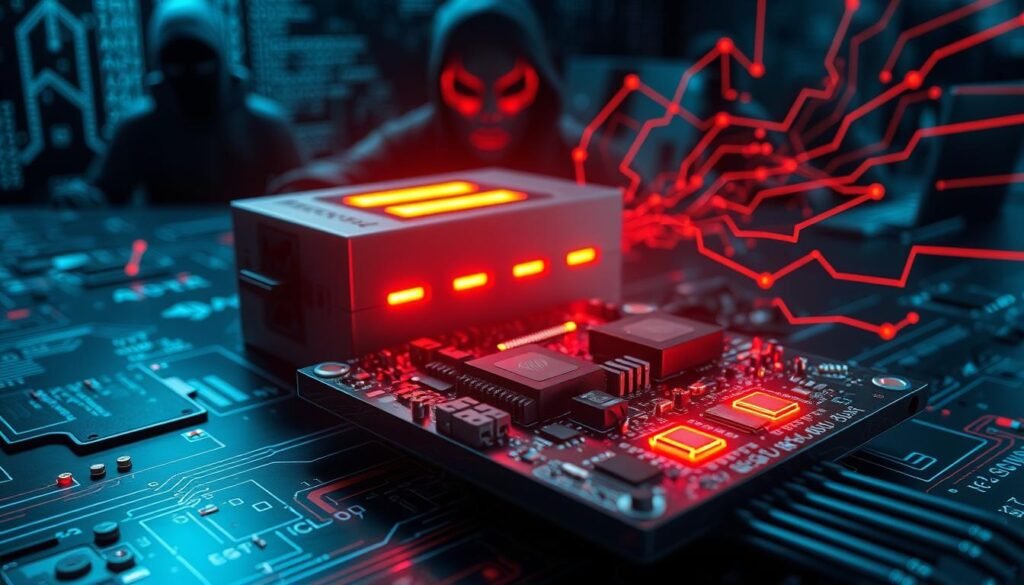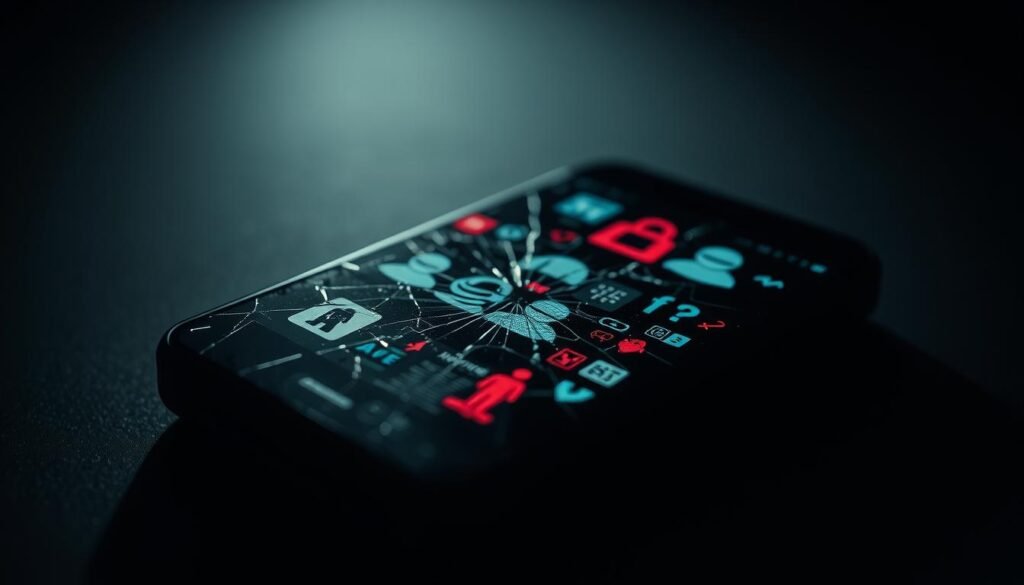A shocking statistic has come to light. DeepSeek’s R1 model is more vulnerable to jailbreaking. This has raised big concerns about security and mobile device jailbreaking. With more AI-powered devices around, keeping them safe is a big deal.
The R1 model’s weakness to jailbreaking is a big risk. It affects device security a lot. It’s important to understand how serious this problem is.
Key Takeaways
- DeepSeek’s R1 model is more vulnerable to jailbreaking, posing significant security risks.
- Security vulnerabilities in the R1 model can lead to serious consequences, including data leaks and unauthorized access.
- Mobile device jailbreaking is a major concern, and the R1 model’s susceptibility to it highlights the need for improved security measures.
- Government agencies, such as NASA and the US Navy, have banned the use of DeepSeek due to security concerns.
- The open-source nature of the R1 model invites potentially unauthorized modifications, which could weaken its security protocols.
- Recent assessments indicate that the R1 model’s ability to produce harmful content compromises its safety protocols significantly.
- Leading Chinese companies, including Tencent and Huawei, have integrated the R1 model, despite security concerns.
Overview of DeepSeek R1
DeepSeek R1 is a top-notch AI tech for cybersecurity and phone security. Yet, its main features and the need for tech device security are often ignored. This leads to big security gaps. The R1 model aims to offer advanced AI powers but lacks in security.
What Is DeepSeek R1?
DeepSeek R1 is an AI model known for its human-like responses. But, it’s also seen as a cybersecurity risk, being easy to jailbreak.
Key Features of DeepSeek R1
DeepSeek R1 can learn from users and respond based on that. But, this ability raises DeepSeek phone security concerns. It might let hackers get to user data.
Importance of Security in Tech Devices
Security in tech devices is super important. With AI models like DeepSeek R1, cybersecurity risks grow. It’s key to make sure these models are secure to avoid vulnerabilities.
Understanding Jailbreaking
Jailbreaking lets users get into a device’s operating system without permission. This can be done with R1 jailbreak exploits. After jailbreaking, users can put on software not approved by the maker. This can lead to big security problems, like getting malware or losing personal data.
The dangers of mobile device jailbreaking are many. Jailbroken phones can spread viruses, steal personal info, and even start cyberattacks. They can also get around security to see things they shouldn’t and install apps not checked by the maker.

- Installation of malware and unauthorized software
- Unauthorized access to sensitive data
- Bypassing of security measures
- Spread of malware and launch of cyberattacks
It’s key for users to know these risks and protect their devices. They should avoid dodgy links, use strong passwords, and keep their devices and software current.
Reports on Vulnerability
Recent studies have uncovered security vulnerabilities in DeepSeek’s R1 model. This has raised serious concerns about its ability to be jailbroken. The R1 model is found to be more vulnerable than earlier versions, posing significant cybersecurity risks.
Experts say the R1 model is three times more biased than Claude-3 Opus. It is also four times more likely to create unwanted content compared to GPT-4.
The statistics are alarming. There’s a 100% failure rate in blocking harmful prompts. This has highlighted the urgent need for better AI safety standards in areas like healthcare, defense, and finance.
The Wall Street Journal has noted the R1 model’s ease of manipulation for dangerous content. This shows significant security flaws.

The DeepSeek R1 model can generate harmful content, including illegal activity instructions. This has raised concerns about its safety protocols and the need for strong cybersecurity risks measures. As AI models like R1 are integrated into systems, prioritizing security standards is vital.
Sam Rubin from Palo Alto Networks’ Unit 42 has pointed out DeepSeek’s model is “more vulnerable to jailbreaking than other models.” The South Korean National Intelligence Service has also warned about DeepSeek’s data collection practices. As AI technology becomes more widespread, addressing cybersecurity risks linked to DeepSeek R1 is essential.
Impact of Vulnerability on Users
The DeepSeek R1 model’s vulnerability can lead to serious issues for users. This includes losing sensitive data and unauthorized access to their devices. These problems are made worse by the smartphone security threats already out there. The risk of R1 jailbreak exploits adds to these dangers.
Some possible outcomes of this vulnerability are:
- Loss of personal data, such as contacts and photos
- Unauthorized access to the device, allowing hackers to install malware or steal sensitive information
- Compromise of DeepSeek phone security, putting users’ personal and financial information at risk
It’s vital for users to know about these risks. They should protect themselves by keeping their devices and software updated. They should also be careful when downloading apps or clicking on links.

| Consequence | Description |
|---|---|
| Loss of personal data | Sensitive information, such as contacts and photos, may be stolen or compromised |
| Unauthorized access | Hackers may gain access to the device, allowing them to install malware or steal sensitive information |
| Compromise of DeepSeek phone security | The vulnerability may put users’ personal and financial information at risk, compromising the security of their device |
DeepSeek’s Response
DeepSeek has spoken out about the R1 model’s vulnerability. They acknowledge the security issues and are working on fixes. They aim to make the DeepSeek R1 model safer for users.
DeepSeek plans to take several steps to improve security. These include:
- Regular security audits to find and fix problems
- Stronger encryption to keep user data safe
- Better ways to handle security breaches quickly
DeepSeek’s actions are a positive step. But, they must keep focusing on cybersecurity. This will help prevent future problems and keep users’ trust.
As DeepSeek moves forward, users should stay alert. They need to protect themselves from security threats. Together, DeepSeek and users can make the R1 model a safe place.
| Measure | Description |
|---|---|
| Security Audits | Regular audits to identify and address possible vulnerabilities |
| Encryption Methods | Stronger encryption to protect user data |
| Incident Response | Improved ways to handle security breaches quickly |
Expert Opinions
Security experts have looked into DeepSeek’s R1 model’s weakness. They shared their thoughts on the issue. The user community also spoke up, saying we need strong security.
Experts warn that mobile device jailbreaking is a big risk for smartphones. The R1 jailbreak exploits can cause serious problems. The main worry is that these threats could harm user data and privacy.
A list of key concerns about the R1 model includes:
- Potential for jailbreaking, allowing unauthorized access to user data
- Vulnerability to R1 jailbreak exploits, which can lead to security breaches
- Increased risk of smartphone security threats, compromising user privacy and data
Experts suggest that users should protect their devices. By knowing the dangers of mobile device jailbreaking and R1 jailbreak exploits, users can stay safe. This helps keep their devices secure.
| Security Measure | Description |
|---|---|
| Regular Updates | Keep the device and operating system up-to-date with the latest security patches |
| Strong Passwords | Use complex and unique passwords for all accounts and devices |
| Two-Factor Authentication | Enable two-factor authentication to add an extra layer of security |
Recommendations for Users
To keep your device safe, there are a few key steps to take. Make sure your device’s operating system is always up to date. This helps fix any security holes. Also, steer clear of suspicious links and downloads to avoid jailbreaking attacks.
Knowing about DeepSeek phone security risks is important. This knowledge helps you protect your device and personal data. Be careful with public Wi-Fi and don’t trust unknown apps.
Steps to Secure Your Device
- Keep your device’s operating system and apps up to date
- Avoid suspicious links and downloads
- Use strong passwords and enable two-factor authentication
- Be cautious when using public Wi-Fi networks
- Avoid the use of untrusted apps
By taking these steps, you can lower the risk of your device being hacked. It’s key to stay updated on security news and follow best practices. This keeps your device and personal data safe.
Best Practices to Avoid Jailbreaking Risks
Jailbreaking can put your device at risk. It can disable security features. Avoid jailbreaking and follow these tips to protect your device and data.
| Best Practice | Description |
|---|---|
| Keep software up to date | Regularly update your device’s operating system and apps to ensure you have the latest security patches |
| Use strong passwords | Use unique and complex passwords for all accounts, and enable two-factor authentication when possible |
| Avoid suspicious links and downloads | Be cautious when clicking on links or downloading apps from unknown sources, as they may contain malware or other security threats |
Conclusion
Our use of technology is growing fast. This makes it more important than ever to keep our devices safe. The problems found in DeepSeek’s R1 model show how critical it is to stay alert.
Prioritizing Device Security
It’s up to us to protect our devices and personal info from jailbreaking risks. We should update our devices regularly, avoid dodgy links, and back up our data often. These steps can help a lot in keeping our devices safe.
The Ongoing Battle for Cybersecurity
The issues with DeepSeek’s R1 model highlight the ongoing fight for online safety. Tech companies need to focus on making their products secure. At the same time, laws and rules must be clear to protect our privacy and data.
FAQ
What is DeepSeek R1?
What are the key features of the DeepSeek R1?
What is jailbreaking and why is it a concern for the DeepSeek R1?
What are the recent findings on the DeepSeek R1’s vulnerability?
How can the vulnerability of the DeepSeek R1 impact users?
How has DeepSeek responded to the reported vulnerability?
What do security experts and the user community say about the DeepSeek R1 vulnerability?
How can users secure their DeepSeek R1 devices and avoid jailbreaking risks?
Source Links
- DeepSeek AI draws ire of spy agency over data hoarding and hot bias – https://www.yahoo.com/news/deepseek-ai-draws-ire-spy-134257935.html
- DeepSeek R1: The Open-Source AI Model Making Waves for All the Wrong Reasons! – https://opentools.ai/news/deepseek-r1-the-open-source-ai-model-making-waves-for-all-the-wrong-reasons
- DeepSeek AI draws ire of spy agency over data hoarding and hot bias – https://www.digitaltrends.com/computing/deepseek-ai-data-collection-ai-spy-agency-korea-bias/
- DeepSeek’s R1 AI Model Faces Security Scrutiny Over Jailbreaking Vulnerabilities – Tech Transformation – https://tech-transformation.com/daily-tech-news/deepseeks-r1-ai-model-faces-security-scrutiny-over-jailbreaking-vulnerabilities/
- TechRisk #107: DeepSeek failed safety tests – https://techriskguru.com/p/techrisk-107-deepseek-failed-safety-tests
